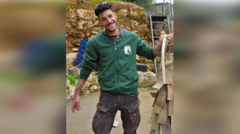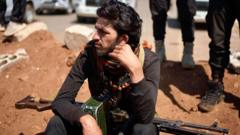A suicide bombing at a church in Damascus has left at least 22 dead and many more wounded, raising alarms over the resurgence of extremist violence in the region.
Suicide Bombing at Damascus Church Claims 22 Lives, Sparking Outrage

Suicide Bombing at Damascus Church Claims 22 Lives, Sparking Outrage
A tragic attack on worshippers highlights ongoing security challenges in Syria.
In a shocking incident on Sunday evening, a suicide bomber targeted the Greek Orthodox Church of the Prophet Elias in the Dweila neighborhood of Damascus, resulting in at least 22 fatalities and injuring 63 others, according to the Syrian health ministry. Eyewitness accounts describe a scene of chaos and horror as the attacker, reportedly connected to the jihadist group Islamic State (IS), opened fire on congregants before detonating an explosive vest.
Visual evidence from the church interior reveals significant destruction, including a shattered altar and blood-stained floors. Witness Lawrence Maamari recounted events leading up to the explosion, noting that churchgoers attempted to subdue the assailant before he detonated the bomb. Another witness, Ziad, described hearing gunfire followed by an explosion that sent debris flying.
This incident marks the first major attack in Damascus since Islamist rebel factions ousted Bashar al-Assad in December, signaling a potential resurgence of violent extremism in Syria after years of civil war. Located near the Bab Sharqi gate, the church has become a grim reminder of the vulnerabilities faced by religious communities in the region.
In response to the attack, the Greek Orthodox Patriarchate expressed deep sorrow, labeling the tragedy a "treacherous hand of evil." The patriarchate has urged Syrian authorities to take responsibility for ongoing violence against churches and to ensure the safety of all citizens. Interior Minister Anas Khattab described the bombing as a "reprehensible crime," pledging that the Syrian state would continue to pursue civil peace in the face of terrorism.
The United Nations' special envoy for Syria, Geir Pedersen, condemned the attack, calling for unity among Syrians against extremism. Conversely, U.S. special envoy Tom Barrack lamented the attack as an affront to the progress of tolerance and inclusivity in the region.
Despite the proclaimed defeat of IS in 2019, the UN has warned that the group still poses a significant threat, with an estimated 1,500 to 3,000 fighters operating in Syria and Iraq. Previous attack patterns in the region raise concerns about future acts of violence, especially against Christian and other minority communities.
As the aftermath of this attack unfolds, both local and international leaders call for a renewed commitment to safeguarding Syria's diverse populace against a backdrop of complex social and political instability.
Visual evidence from the church interior reveals significant destruction, including a shattered altar and blood-stained floors. Witness Lawrence Maamari recounted events leading up to the explosion, noting that churchgoers attempted to subdue the assailant before he detonated the bomb. Another witness, Ziad, described hearing gunfire followed by an explosion that sent debris flying.
This incident marks the first major attack in Damascus since Islamist rebel factions ousted Bashar al-Assad in December, signaling a potential resurgence of violent extremism in Syria after years of civil war. Located near the Bab Sharqi gate, the church has become a grim reminder of the vulnerabilities faced by religious communities in the region.
In response to the attack, the Greek Orthodox Patriarchate expressed deep sorrow, labeling the tragedy a "treacherous hand of evil." The patriarchate has urged Syrian authorities to take responsibility for ongoing violence against churches and to ensure the safety of all citizens. Interior Minister Anas Khattab described the bombing as a "reprehensible crime," pledging that the Syrian state would continue to pursue civil peace in the face of terrorism.
The United Nations' special envoy for Syria, Geir Pedersen, condemned the attack, calling for unity among Syrians against extremism. Conversely, U.S. special envoy Tom Barrack lamented the attack as an affront to the progress of tolerance and inclusivity in the region.
Despite the proclaimed defeat of IS in 2019, the UN has warned that the group still poses a significant threat, with an estimated 1,500 to 3,000 fighters operating in Syria and Iraq. Previous attack patterns in the region raise concerns about future acts of violence, especially against Christian and other minority communities.
As the aftermath of this attack unfolds, both local and international leaders call for a renewed commitment to safeguarding Syria's diverse populace against a backdrop of complex social and political instability.






















